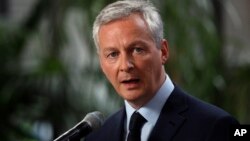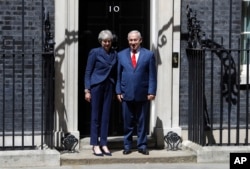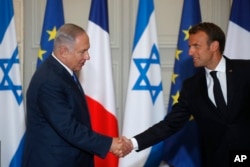Britain, France and Germany have officially requested that European companies conducting business with Iran be exempt from U.S. sanctions that will be imposed on Iran following U.S. withdrawal from a global nuclear agreement.
The ministers from the three European countries said they "strongly regret" U.S. President Donald Trump's decision last month to pull out of the deal in a letter dated Monday to U.S. Treasury Secretary Steven Mnuchin and Secretary of State Mike Pompeo.
"As allies, we expect that the United States will refrain from taking action to harm Europe's security interests," the letter said.
French Economy Minister Bruno Le Maire said the three countries and other EU nations asked the U.S. "to exempt European businesses doing legitimate trade in Iran from all extraterritorial American sanctions."
Trump has argued the 2015 agreement, aimed at preventing Iran from developing nuclear weapons in exchange for lifting economic sanctions, was not tough enough on Tehran. Trump said U.S. sanctions will be imposed on any company engaged in business with Iran.
Many European and U.S. companies rushed to invest in Iran after sanctions were lifted since the pact took effect in 2016 and have the most to lose from the renewed sanctions.
The ministers reiterated in the letter the agreement with Iran is still the "best means" to prevent Tehran from becoming a nuclear power. They also warned that an Iranian withdrawal from the deal would "further unsettle a region where additional conflicts would be disastrous."
The letter was published Wednesday, one day after Tehran said it was planning to resume uranium enrichment within the parameters of the agreement. Iran's announcement was apparently a signal that it could resume efforts to develop an industrial-scale enrichment program if the nuclear agreement unravels.
Meanwhile, Israeli Prime Minister Benjamin Netanyahu meets with British Prime Minister Theresa May in London Wednesday, concluding the final leg of a three-day European tour aimed at persuading European leaders to alter the international nuclear agreement with Iran.
Netanyahu began his three-day European tour Monday in Germany, where he warned Chancellor Angela Merkel that Iranian meddling in the Middle East could spark massive new refugee flows to Europe. In France Tuesday, the Israeli leader said his interest is "making sure Iran doesn't have nuclear weapons."
"I've been very consistent about my opposition to this nuclear deal, because I said you cannot divorce this from Iran's aggression in the region," Netanyahu told a joint news conference with French President Emmanuel Macron Tuesday.
Macron said France will continue to work with the Joint Comprehensive Plan of Action (JCPOA), which it considers the best way to control Iran's nuclear activity.
"The JCPOA is not sufficient, and I absolutely agree, but still, it's better than what we had before," he said. Macron said he doesn't see how exiting the nuclear deal would help improve regional stability.
Britain, France and Germany agreed to the deal with Iran in 2015 along with Russia, China and the United States.
Trump announced last month the U.S. was pulling out of what he called a "horrible, one-sided deal," while saying he wants additional restrictions on Iran's ballistic missile program and what he called its "destabilizing activities in the Middle East."
Like Trump, Netanyahu has been a fierce critic of the deal, saying the agreement left Iran with the potential to quickly develop a nuclear weapon when the terms expire.
Iran has said repeatedly its nuclear activity was solely peaceful in nature.
Iranian Foreign Minister Mohammad Javad Zarif said Sunday the U.S. decision to withdraw from the agreement was illegal, and he urged the other signatories not to follow suit.
State-run Iranian media said Zarif sent a letter to the foreign ministers of the remaining nations. He asked them to "make up" for the Iranian losses brought on by the U.S. withdrawal if they want to save the deal.
Zarif called the 2015 nuclear agreement the result of "accurate, sensitive and balanced multilateral talks."
"The illegal withdrawal of the U.S. government... especially bullying methods used by this government to bring other governments in line, has discredited the rule of law while challenging the principles of the U.N. Charter and efficiency of international bodies," Zarif wrote.







